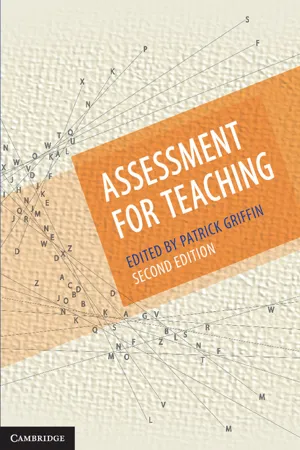Assessment for Teaching
About this book
Grounded in contemporary, evidence-based research, the second edition of Assessment for Teaching provides a comprehensive introduction to assessment and teaching in primary and secondary school settings. Taking a practical approach to assessment and the collaborative use of data in the classroom, this text advances a developmental model of assessment which aims to improve student outcomes through targeted teaching interventions. Thoroughly revised and updated to include the latest research, this edition features expanded content on collaborative teaching, competence assessment, learning and assessment and self-regulated teaching and learning. Each chapter features learning objectives, reflective questions, an extended exercise to link course content with classroom practice, and end-of-chapter rubrics which help readers assess their own understanding and learning. Written by a team of experts from the Assessment Research Centre at the University of Melbourne, Assessment for Teaching is an essential resource for both preservice teachers and inservice teachers.
Tools to learn more effectively

Saving Books

Keyword Search

Annotating Text

Listen to it instead
Information
Table of contents
- Cover
- Half-title
- Title page
- Copyright information
- Table of contents
- Contributors
- Figures
- Tables
- Abbreviations
- Acknowledgements
- Preface
- Introduction
- Chapter 1 Assessment as the search for evidence of learning
- Chapter 2 Collaborative teaching teams
- Chapter 3 Competence assessment: A clinical approach
- Chapter 4 Conducting assessments: Making sure the evidence of learning is interpretable
- Chapter 5 Judgement-based assessment
- Chapter 6 Writing rubrics
- Chapter 7 Self-regulated learning
- Chapter 8 Building a development progression
- Chapter 9 Guttman Analysis
- Chapter 10 Interpreting data to evaluate growth
- Chapter 11 Developmental assessment for students with additional needs
- Chapter 12 Case study: Wilderness School, Adelaide, South Australia
- Annex 1 School leadership and assessment
- Annex 2 Using the online tests and reports: Objective testing
- Index
Frequently asked questions
- Essential is ideal for learners and professionals who enjoy exploring a wide range of subjects. Access the Essential Library with 800,000+ trusted titles and best-sellers across business, personal growth, and the humanities. Includes unlimited reading time and Standard Read Aloud voice.
- Complete: Perfect for advanced learners and researchers needing full, unrestricted access. Unlock 1.4M+ books across hundreds of subjects, including academic and specialized titles. The Complete Plan also includes advanced features like Premium Read Aloud and Research Assistant.
Please note we cannot support devices running on iOS 13 and Android 7 or earlier. Learn more about using the app
